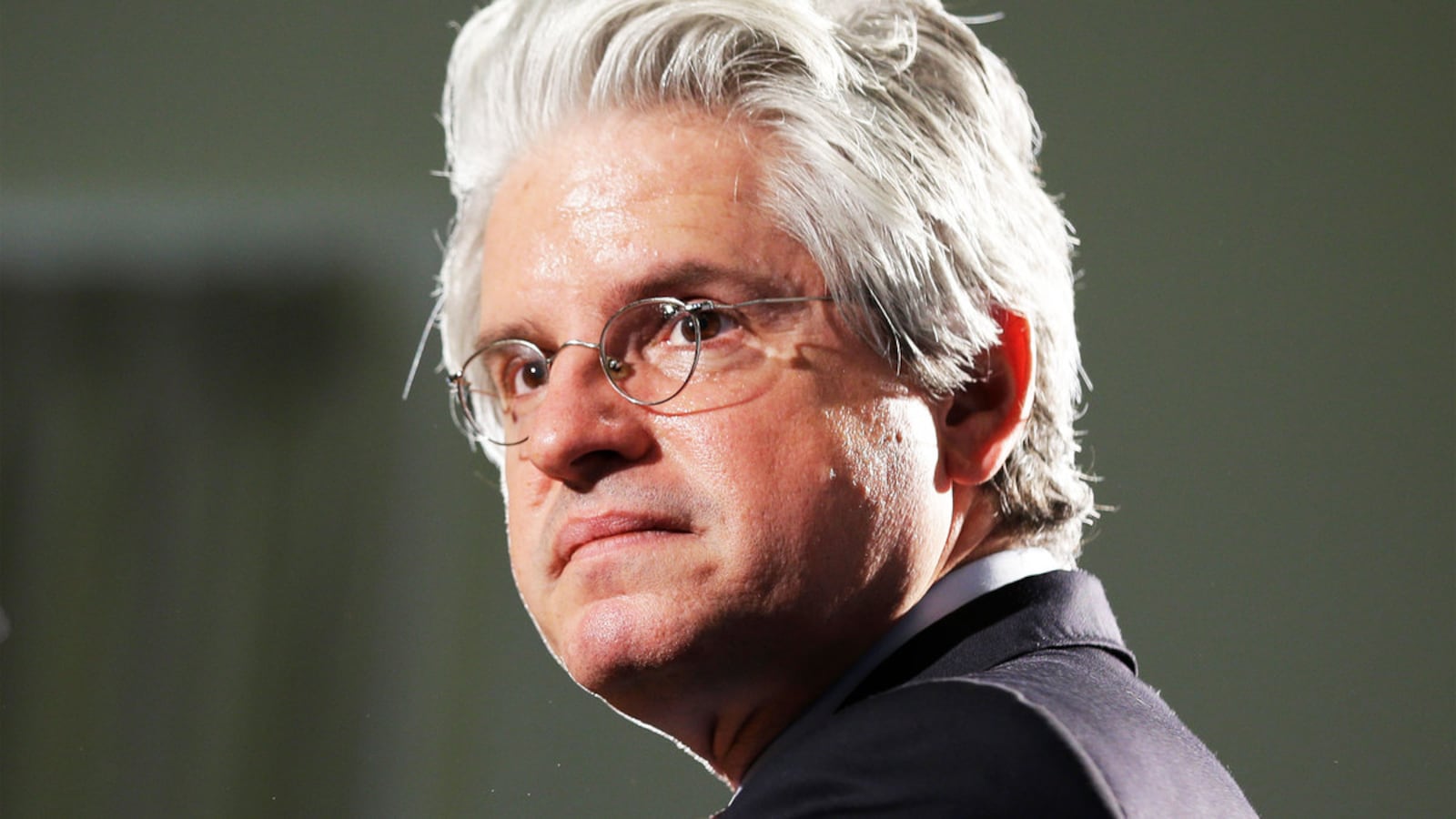A conservative group has filed complaints with the IRS accusing leading liberal activist David Brock of illegally profiting from the vast network of groups he has built within the Democratic Party’s infrastructure.
The complaints, which were filed by the Patriots Foundation, a right-leaning nonprofit, and reviewed by The Daily Beast, detail a series of transactions that, the group says, show the injection of money from a tax-exempt group Brock founded into a private, for-profit news business that he owns.
“These complaints we filed provide damning indictment of serious allegations about how his organizations have circumvented rules and exploited the tax-exempt status of the organizations for personal benefit and partisan political purposes, and potentially siphoning millions for improper purposes,” Patriots Foundation co-founder Craig Robinson told The Daily Beast in a statement.
The nonprofit at issue is the American Bridge 21st Century Foundation, and it’s part of a constellation of entities that Brock has seeded over the years and which he tasked in early 2017 to, in his words, “kick Donald Trump’s ass.” The foundation is the “dark money” affiliate of AB PAC, a super PAC that is pouring millions of dollars into an effort to defeat Trump in November.
Brock’s network also includes a for-profit news venture called the American Independent. That outlet is owned by a company he formed in late 2015 called True Blue Media LLC. When Brock convened donors at a retreat in early 2017 to brief them on his anti-Trump efforts going forward, he billed True Blue Media’s news operation explicitly as a revenue-generating enterprise that would sell advertising and subscriptions.
Over the next two years, American Bridge’s nonprofit arm invested more than $2.6 million in True Blue Media, according to tax filings. Those filings list Brock’s ownership stake in the LLC as greater than 35 percent. The structure appears to have resembled a convertible note; in exchange for that cash infusion, American Bridge was promised future equity in the media company. It’s not clear if that equity was ever provided.
The Patriots Foundation alleges that those transactions ran afoul of Internal Revenue Service rules barring the use of a nonprofit’s funds (in this case, American Bridge’s) to financially benefit those who run it. “We’re calling on the IRS to conduct a thorough investigation of Brock’s organizations and to hold them accountable for all violations,” Robinson said.
American Bridge president Bradley Beychok told The Daily Beast in an emailed statement that the transaction was a legitimate arms-length investment in line with the group’s tax-exempt activity.
“The investment in True Blue Media, LLC was determined by the Independent Board of Directors to further the mission of AB Foundation,” Beychok wrote. He dismissed the Patriots Foundation complaint as “just another in a long string of lies and false accusations“ designed to “purposely mislead the public in order to further its right wing agenda.”
“To remove any potential conflict of interest, David Brock resigned as an officer and a member of the board of directors [of American Bridge] in 2016, before the first investment was made,” Beychok wrote. “In the interest of transparency, the investments were listed on IRS form 990 as both a grant on Schedule I and on Schedule L. AB Foundation received an industry-standard investment agreement and in turn owns stock in True Blue Media.”
Brock’s official role hasn’t always been as clear as that statement suggests. Indeed, American Bridge’s nonprofit arm referred to Brock as its chairman in 2018. Brock continues to describe himself as the chairman of American Bridge’s super PAC arm.
Brock, who is the founder of Media Matters and a high-profile liberal activist, has had a colorful career starting as a conservative journalist where he garnered national attention when he challenged the claims of Anita Hill—parlaying that into a book, The Real Anita Hill, in which his depiction of Hill as “a bit nutty and a bit slutty” was widely quoted. He went on to write another book—this one about Hillary Clinton—before abandoning conservatism entirely, as detailed in a subsequent book: Blinded by the Right: The Conscience of an Ex-Conservative. Brock has since been incredibly active in efforts to both prop up the Clintons and, from there, use his vast resources to try and defeat Trump.
The complaints filed this week underscore the often murky relationships between the various nodes in Brock’s network of advocacy outfits. American Bridge’s super PAC and dark money arms, for instance, share executives, employees, and office space, according to audited financial statements for the latter.
That’s fairly common for advocacy groups with political and nonprofit arms, but best practices generally call for a clear delineation of how shared resources are divided up among those groups, so as not to commingle tax-exempt resources with those devoted to outright politicking. According to its most recent publicly-available financial statements, covering 2018, “the Foundation and American Bridge did not have a formal agreement relating to the allocation of expenses between the two entities.” A source familiar with the arrangement told The Daily Beast that a more formal agreement to that effect was put in place last year.
While such arrangements are common among various forms of nonprofit groups such as charities, dark money advocacy groups, and political action committees, they can be even more legally dicey when for-profit entities are added to the mix.
True Blue Media is just such an entity. In late 2015, it acquired an 80 percent stake in the website Blue Nation Review, which was subsequently renamed Shareblue. Late last year it changed its name again to The American Independent.
The outlet has been determined since the start of the Trump era not just to advance Brock’s political advocacy efforts, but also to generate financial returns.
"Impact and monetization are not mutually exclusive at Shareblue," declared briefing materials circulated to donors at Brock’s early 2017 retreat. "In the second half of 2017 we will move the focus to monetization with the goal of bringing in revenue in Q2 of 2018.”
Those briefing materials spelled out a host of ways that the company would look to bring in revenue, including renting out email lists, offering advertising and sponsored content, selling merchandise, and even creating a “Twitter-like” website available only to paying subscribers.









